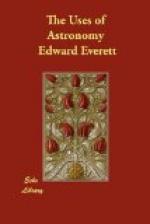in finished style, and with that rich imagery
which characterize the words of the orator, the thoughts
fitting to such an occasion as this. He would
limit himself, he continued, to presenting some
motives why the community should patronize science,
and foster such institutions as this. We
scientific men regard this as an occasion of the highest
interest, and thus do not hesitate to give the sanction
of the highest learned body of the country as
an indorsement of the liberality of this State.
The geological survey of New York has given to
the world a new nomenclature. No geologist can,
hereafter, describe the several strata of the
earth without referring to it. Its results,
as recorded in your published volumes, are treasured
in the most valuable libraries of the world.
They have made this city famous; and now, when the
scientific geologist lands on your shore, his
first question is, “Which is the way to
Albany? I want to see your fossils.”
But Paleontology is only one branch of the subject,
and many others your survey has equally fostered.
He next proceeded to show that organized beings were organized with reference to a plan, which the relations between different animals, and between different plants, and between animals and plants, everywhere exhibit;—drew sections of the body of a fish, and of the bird, and of man, and pointed out that in each there was the same central back-bone, the cavity above and the ribbed cavity below the flesh on each side, and the skin over all—showing that the maker of each possessed the same thought—followed the same plan of structure. And upon that plan He had made all the kinds of quadrupeds, 2,000 in number, all the kinds of birds, 7,000 in number, all of the reptiles, 2,000 to 3,000 in number, all the fish, 10,000 to 12,000 in number. All their forms may be derived as different expressions of the same formula. There are only four of these great types; or, said he, may I not call them the four tunes on which Divinity has played the harmonies that have peopled, in living and beautiful reality, the whole world?
Professor Hitchcock on reminiscences.
Erastus C. Benedict, Esq. of New York, introduced Prof. Hitchcock, of Amherst, as a gentleman whose name was very familiar, who had laid aside, voluntarily, the charge of one of the largest colleges in New England, but who could never lay aside the honors he had earned in the literature and science of geology.
After a few introductory observations, Prof. Hitchcock said:—
This, I believe, is the first example in which a State Government in our country has erected a museum for the exhibition of its natural resources, its mineral and rock, its plants and animals, living and fossil. And this seems to me the most appropriate spot in the country for placing the first geological hall erected by the Government; for the County of Albany was the district where the




